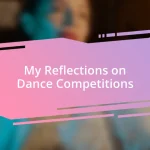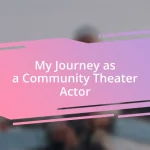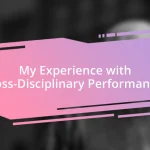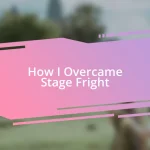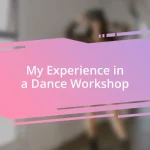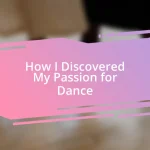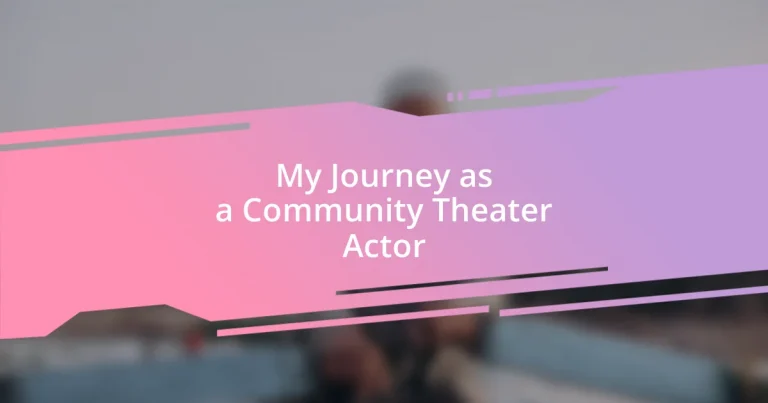Key takeaways:
- Transformative experience during auditions led to deep self-discovery and community bonds among cast members.
- Overcoming stage fright involved acceptance, visualization, and support from fellow actors, enhancing performance confidence.
- Reflection on performances fostered personal growth, allowing the integration of personal experiences to enrich character portrayals.
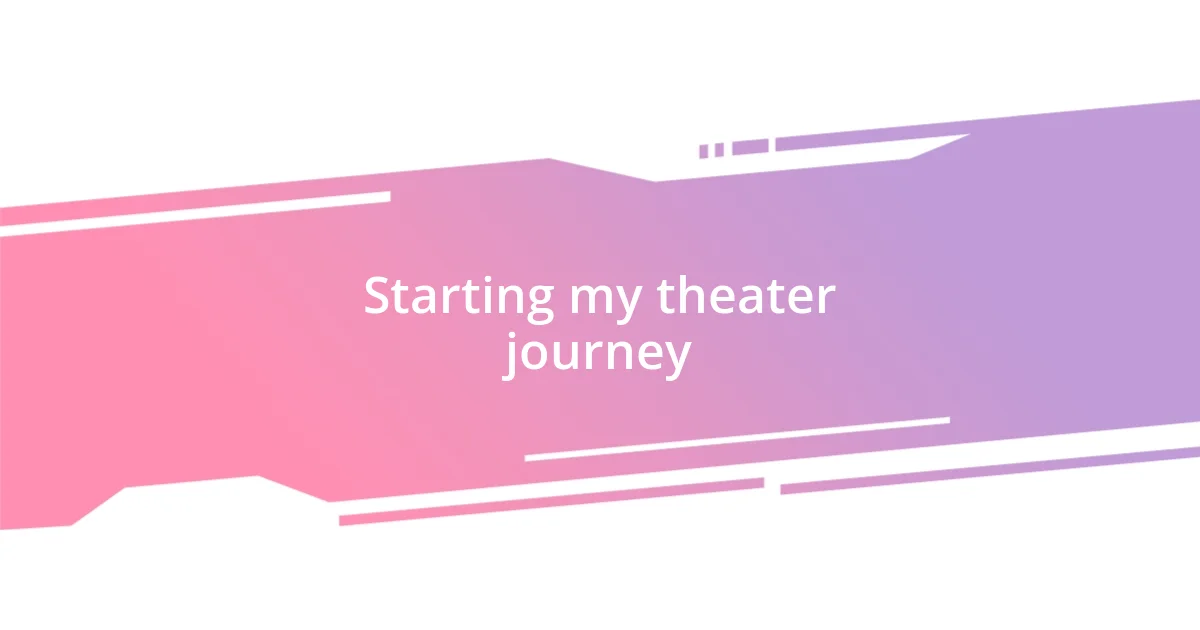
Starting my theater journey
The moment I stepped into my first community theater audition, my heart raced with excitement and a sprinkle of terror. Was I really ready to bare my soul in front of strangers? I remember the sweaty palms and the way my voice trembled, but that thrill of possibility overshadowed the fear.
During my early rehearsals, I realized how transformative this experience could be. I absolutely loved when the director encouraged me to dig deeper into my character. It became a beautiful dance of self-discovery, allowing me to channel emotions I had long tucked away. How often do we get the chance to explore parts of ourselves that we never knew existed?
I distinctly recall the shared laughter and the occasional tears among my fellow cast members. Those late-night rehearsals forged bonds that felt like family. Isn’t it fascinating how a simple love for performing can create such profound connections? For me, that sense of community was everything, urging me to embrace my journey as an actor more fully.
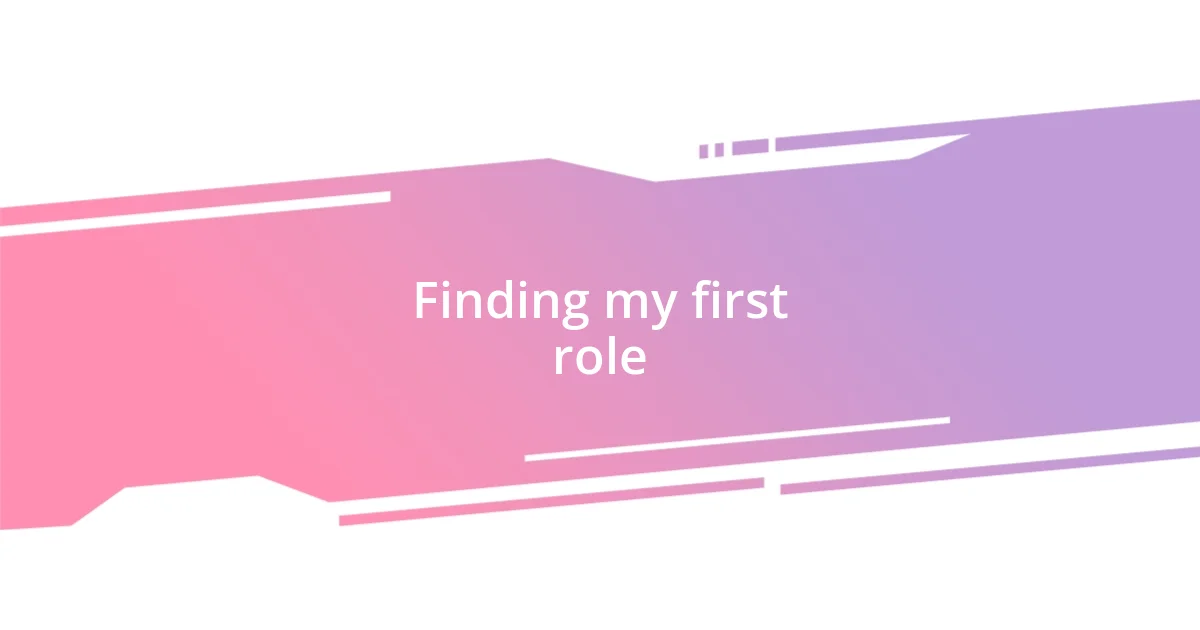
Finding my first role
When I first walked into that audition room, I was a cocktail of nerves and excitement. I scanned my surroundings, taking in the faces of other hopefuls who seemed to exude confidence. I remember recalling an old piece of advice: “Just be yourself.” But honestly, how do you do that when you feel like a deer caught in headlights? I took a deep breath, focused on the script, and suddenly, the world shrank to just me and the character I was about to embody.
After a few nerve-wracking moments, I was called to perform my monologue. The words felt foreign on my tongue, and it took every ounce of courage to let them flow. I stumbled through the lines, heart pounding, but I didn’t give up. That moment taught me that vulnerability often leads to growth. When I finished, the director nodded, and with a few gentle notes, I felt a spark of belief. It was clear that even my shaky start could be the foundation of something beautiful.
A few days later, the cast list was posted. As I scrolled down the page, my heart sank until finally, there it was—a nameplate next to my role! It felt like a personal victory, a culmination of hard work and perseverance. Getting that role wasn’t just about landing a part; it was my first step into a world that would challenge and inspire me. I learned that pursuing my passion would always carry surprises, and sometimes, the journey matters just as much as reaching the destination.
| Aspect | My Experience |
|---|---|
| Emotions during audition | Nervousness mingled with excitement |
| Performance experience | Fumbling through lines but growing in confidence |
| Feeling upon casting | A mix of relief and elation |
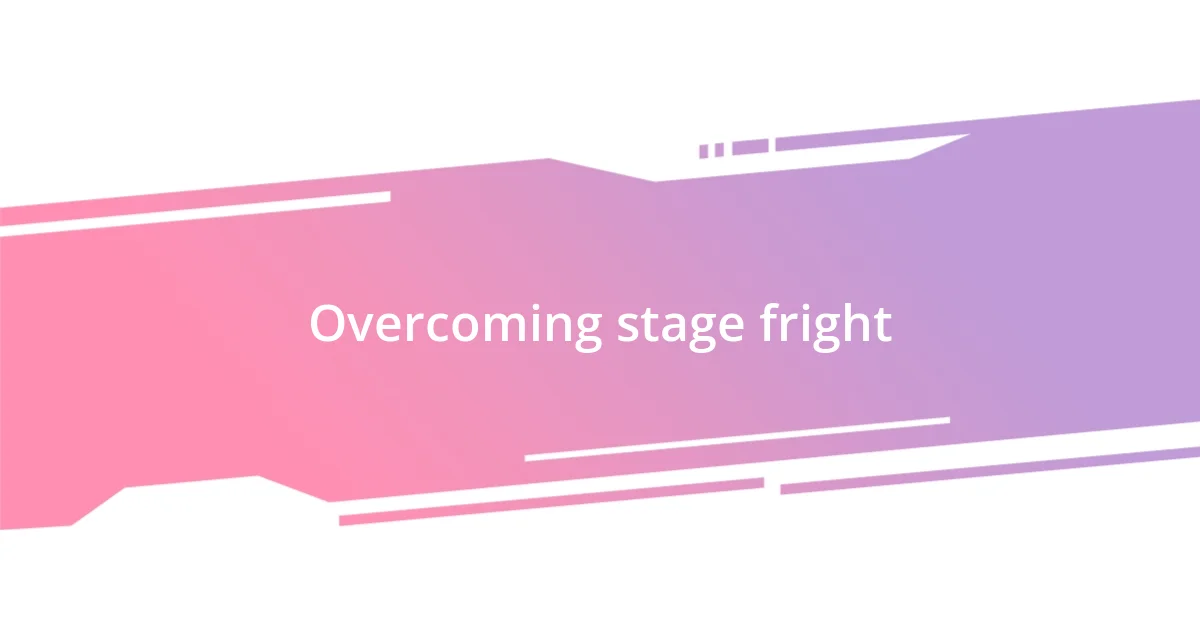
Overcoming stage fright
As I continued my journey in community theater, I encountered stage fright, a common but daunting experience. I remember vividly the first time I stood in front of an audience; my legs felt like jelly, and my heartbeat thundered in my ears. In that moment, I realized that these feelings were universal among performers. I learned that it’s crucial to acknowledge my nerves instead of trying to push them away; simply accepting them helped to lessen their grip.
To effectively tackle stage fright, I found solace in a few strategies that worked wonders for me:
- Visualization: Before stepping on stage, I would close my eyes and picture a successful performance. Imagining the applause and the joy on the audience’s faces made the reality feel tangible.
- Deep Breathing: I discovered that taking deep, intentional breaths calmed my racing heart. This practice became my secret weapon whenever anxiety threatened to overwhelm me.
- Warm-Up Rituals: Engaging in vocal and physical warm-ups not only prepared me but also shifted my focus from fear to the excitement of performing.
- Support from Castmates: Sharing my fears with fellow actors created an immediate sense of camaraderie. We all cheered each other on and celebrated the little victories, solidifying a supportive environment that helped ease my nerves.
With time, I began to view stage fright as a sign that I was alive and passionate about performing. Turning that anxious energy into excitement opened a new chapter in my acting journey, transforming every performance into an opportunity to connect and express myself.

Building character depth
Building character depth is an essential part of acting that I’ve come to appreciate deeply. I remember my desire to create a character that felt genuine and relatable. It wasn’t enough to merely memorize lines; I had to dig into the backstory, understand their motivations, and even imagine how they would react in everyday situations. I often ask myself, “What makes this character tick?” This inquiry led me to uncover layers I hadn’t initially considered, allowing me to portray them with authenticity.
As I developed my first major role, I tried role-playing with friends to explore different facets of my character’s personality. At times, I went too deep, drawing on personal experiences that mirrored the character’s struggles. I can recall sitting alone backstage, feeling a wave of emotion wash over me when I realized how intertwined our journeys were. It was both exhilarating and terrifying to embrace that vulnerability. Through these moments, I learned that weaving personal insights into my performance adds richness. When I stood on stage, I wasn’t just acting; I was sharing a part of my soul.
Additionally, I found that character depth often came from listening to my fellow cast members. Each performance was a collaborative effort, and their interpretations influenced how I viewed my own character. I remember a particular rehearsed scene where my co-actor brought a unique intensity that forced me to respond in real time, turning practice into a dynamic exchange. Wasn’t it fascinating how that moment shaped our connection? It reinforced my belief that acting is more than just individual portrayal; it’s a journey of shared expression and growth that enriches the narrative.
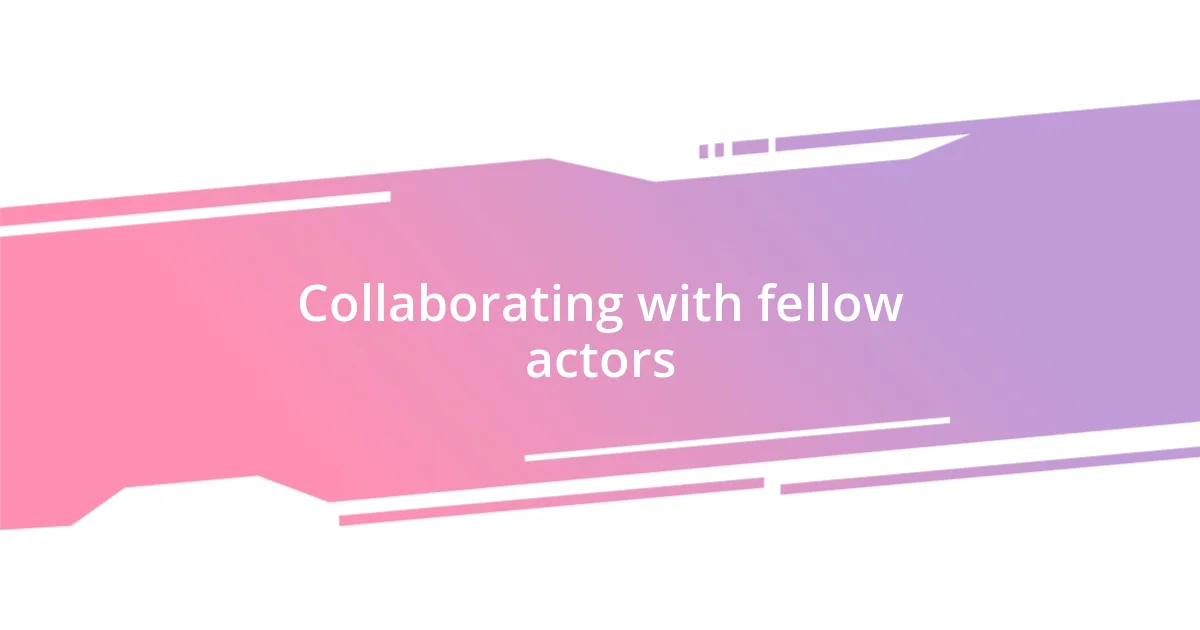
Collaborating with fellow actors
Collaborating with fellow actors has been one of the most rewarding aspects of my theater journey. I still remember rehearsing for a challenging scene where I had to confront my co-actor with raw emotion. As we worked together, their interpretation sparked something in me; I felt a wave of inspiration that made my performance richer. Have you ever felt how a fellow artist can bring out hidden depths in your own work? It’s exhilarating and transformative.
There’s a unique magic in the synergy that forms among cast members during rehearsals. During one performance, my partner and I were having an off day, and instead of letting that dampen our spirits, we decided to switch our focus and support one another. By exchanging quick jokes during breaks, we lightened the mood and lifted our performances. I discovered that these intimate moments not only enhanced our connection but also enriched our on-stage chemistry. Have you noticed how laughter can create a bond that translates seamlessly into the performance?
Moreover, constructive feedback from fellow actors has played a pivotal role in my growth. I remember a specific incident during a feedback session where one of my castmates pointed out how I was missing some subtleties in my gestures. Initially, I felt defensive, but I took a moment to reflect. What if those insights could elevate my work? After making the adjustments, I saw firsthand how collaboration turned my character into a more nuanced portrayal. That experience taught me that openness and trust among castmates are fundamental, creating a supportive environment where everyone thrives as artists.
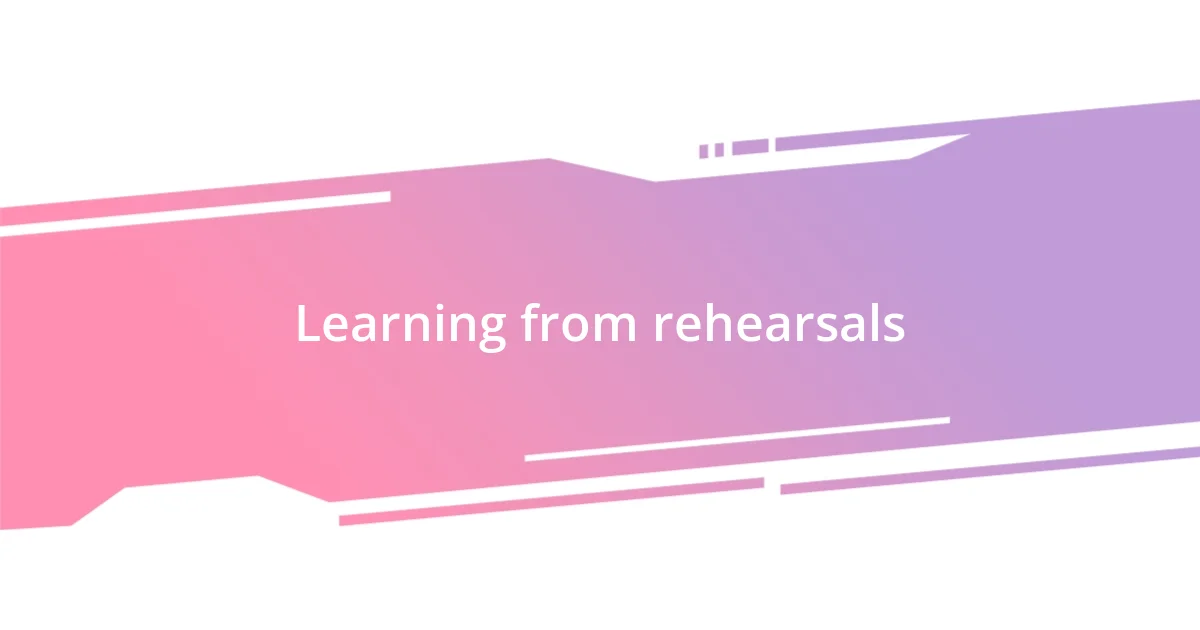
Learning from rehearsals
Rehearsals have been my personal laboratory for experimentation and growth. I distinctly remember a time when I attempted a scene that initially felt flat. It wasn’t until our director encouraged a freeform rehearsal, urging us to improvise, that I stumbled upon a deeper emotional authenticity. Have you ever tried to breakout from scripts and simply feel the moment? In those improvisational intervals, I found nuggets of inspiration that revitalized my interpretation of the scene. Each rehearsal became a canvas where I could explore different shades of my character.
It’s fascinating how repetition can unearth new opportunities for learning. I often came into rehearsals with a set understanding of my role, but as we cycled through scenes, the nuances of timing and delivery became clearer. One particularly eye-opening moment happened when I misread a line during practice and it sparked an unexpected reaction from my co-actor—it was raw and genuine. Suddenly, in that unscripted turn, I learned more about my character’s relationships than I ever could through careful study. Have you ever realized that mistakes can lead you to discover something unexpected? That day, I understood that sometimes, it’s within our missteps where the magic truly lies.
Moreover, rehearsals aren’t just about refining scripts; they serve as a mirror reflecting personal growth. I recall standing backstage after a particularly intense rehearsal, feeling overwhelmed by the emotional weight I had tapped into. It struck me—acting isn’t just about portraying another; it’s also about revealing aspects of ourselves. How many actors acknowledge that their struggles can resonate profoundly with their characters? I’ve learned to embrace that vulnerability, understanding that genuine connection can transcend the stage, leaving both the audience and me feeling profoundly moved.
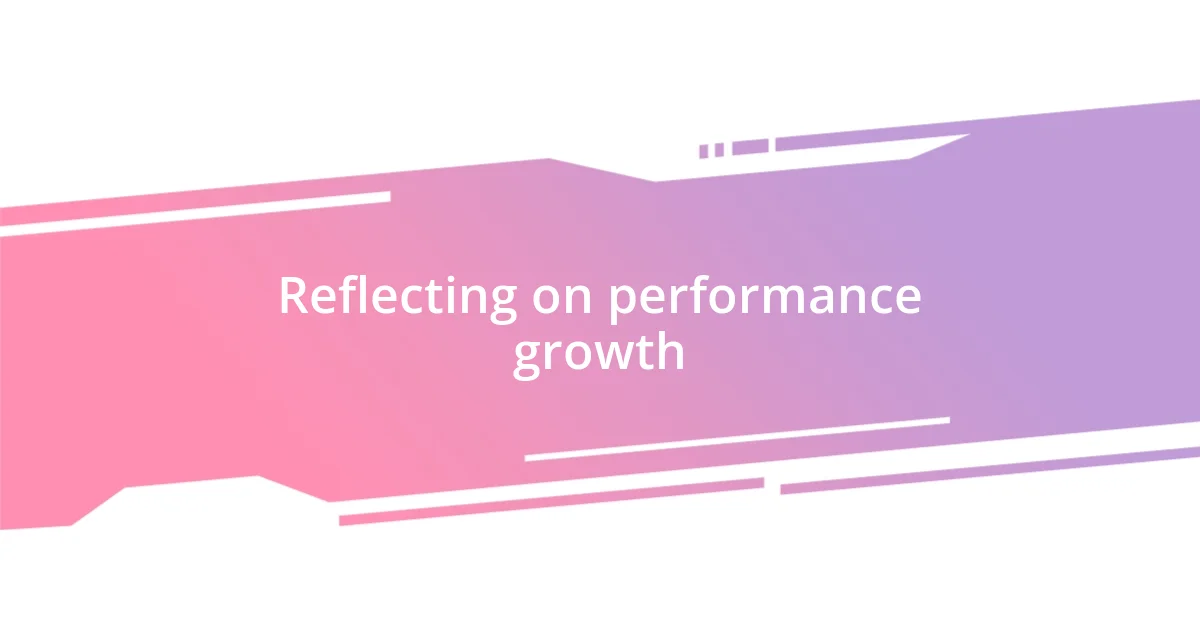
Reflecting on performance growth
Reflecting on my journey as a community theater actor, I realize how pivotal moments shaped my performance growth. I once found myself completely overwhelmed on stage, fumbling lines during a particularly demanding scene. After the show, I felt disheartened, but the encouragement from my director made all the difference. “Every stumble is just a step toward growth,” they said, reminding me that vulnerability is part of the art. Have you ever experienced that weight of expectation? It’s through those humbling experiences that I learned the true essence of resilience.
One of the best ways to measure growth is through self-reflection after a performance. I vividly remember sitting in my car, replaying a show in my mind, from my entrance to the final bow. Was I fully present? Did I connect with the audience? The feeling of satisfaction or regret can often be my greatest teachers. There’s something profound about evaluating those moments; it allows me to set tangible goals for improvement. Have you ever taken a moment to critically assess your own work? For me, that practice instilled a sense of accountability and sparked a commitment to continually evolve as an actor.
As I’ve navigated this path, I often find myself tapping into my own life experiences to deepen my performances. I recall a moment when I drew on a personal heartbreak to fuel a dramatic scene. The transformation felt electric; my portrayal resonated more authentically because I was pulling from something genuine. This connection taught me that my own emotions can be powerful tools in reconstructing a character’s world. Can you relate to that feeling of tapping into your own life for inspiration? It’s a reminder that our stories are somehow intertwined with the characters we portray, and those insights are invaluable for any performer.


